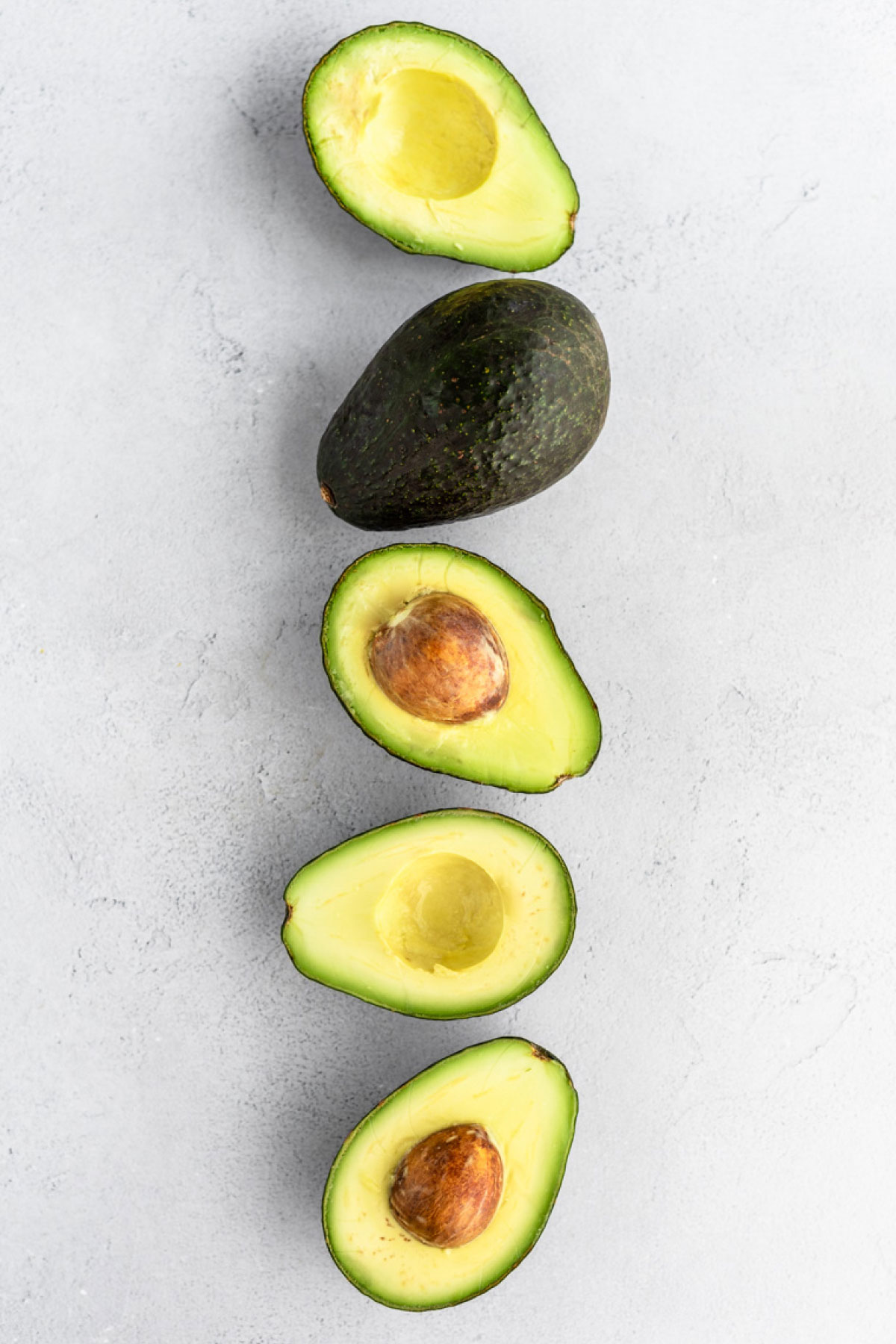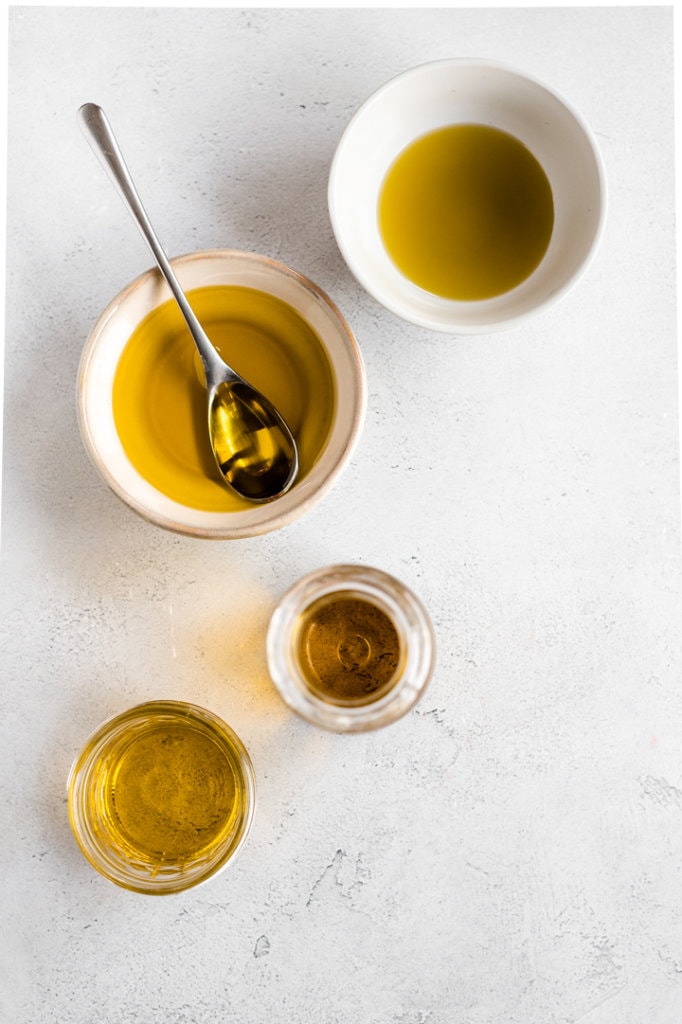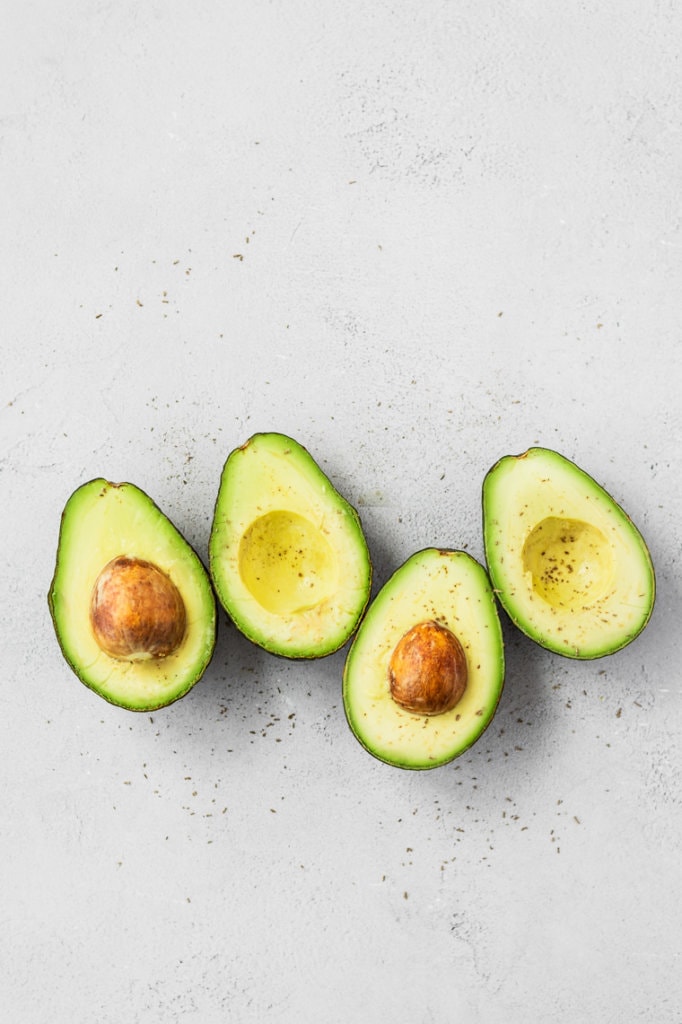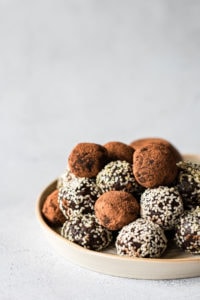There are four main types of fats: Trans, Saturated, Polyunsaturated and monounsaturated fats. All with different bodily roles and health impacts.

Jump to:
We've been taught to fear fat, as we’re now living in the era of low-fat everything… Low-fat milk, low-fat cheese, even fat-free half and half— what the heck is that stuff made of anyway?!
Cutting down on fat has arguably made our health even worse, as most Americans cut down on both unhealthy and healthy fats, and replaced those calories with processed foods and added carbohydrates.
Is fat bad?
Well, it stems from the fact that fat inherently has more calories per gram than both protein and carbohydrates combined. So I suppose the idea that eating fat makes you fat, seems logical. But thankfully, this just isn't the case.
Dietary fat is necessary for our bodies (it keeps our skin and hair healthy) and actually keeps us feeling full for longer!
For the yogurt eaters out there - consider your fullness level after eating a full-fat yogurt versus the fat-free version. The full-fat version will certainly fill you up more, as fat helps the body absorb vital nutrients that are necessary for building cell membranes and aiding in muscle movement.

4 Types of Fat
They all have a similar chemical structure, consisting of a chain of carbon atoms with hydrogens attached. The difference between these fats is their length, shape, and number of hydrogens attached to the carbons.
And these seemingly small differences can have a BIG impact on our bodies and overall health.
Now don’t go overboard and slap butter on everything because I said fat wasn’t bad, keep on reading. Let's briefly talk about the different types of fat. Not all fat is created equal, after all.
Trans Fat
Trans fat - yikes this stuff is BAD for your health. Also known as hydrogenated oil, it's a man-made product and has VERY NEGATIVE impacts on our health.
There are a few foods (like meat and dairy products) that have naturally occurring trans fats; and it’s important to note that these naturally-occurring trans fat are NOT bad for your health.
It’s the man-made trans fats that we should all be avoiding. This man-made fat is manufactured by turning a solid fat into a liquid fat. More specifically, by changing the shape of the carbon-hydrogen chemical structure.
Artificial trans fats have gained popularity among food companies because it’s cheap to produce, and creates very shelf-stable food products. But this stuff is best avoided, as there is no safe level of trans fat.
In fact, the FDA has now banned the use of trans fat in foods - thank goodness!
Trans fat increases LDL (bad) cholesterol and reduces HDL (good) cholesterol.
According to Harvard Medical School, for every 2% caloric intake increase of trans fat, there’s a 23% increase in your risk of heart disease. That’s a shocking statistic...
Generally we find BAD-for-your-health trans fats in highly-processed foods like boxed meals, stick margarine, commercially-prepared baked goods and vegetable shortening (among countless others).
Although trans fat is required to be listed on the nutrition facts of the food label, many companies find new ways to sneak around listing trans fat on their products - like decreasing the serving size.
A better way to assess the trans fat content of food is to look at the ingredients list. If you see the words hydrogenated oil in the ingredients list, back away… But with the ban, luckily this awful ingredient really shouldn’t be in our foods anymore.

Saturated Fats
This type of fat is mostly found in animal products (meat and dairy) and tropical oils like coconut oil, is generally solid at room temperature (think about how bacon grease solidifies when it cools to room temperature).
Saturated fat was once thought to be the sole cause for heart disease. But based on new research, saturated fat may not be as bad as we once thought.
We still have more to learn, but the research points to saturated fat increasing both HDL and LDL.
As we mentioned, HDL is your good cholesterol that removes cholesterol from the blood and carries it to the liver for recycling. While LDL is your bad cholesterol, contributing to plaque build up in your arteries.
Though more recent research is indicating that although saturated fat increases your LDL cholesterol, it’s the big fluffy kind, as opposed to the small dense kind. The larger variety doesn’t seem to have the same negative effect on heart health as the small variety, and isn’t as susceptible to oxidative stress.
However, this is no excuse for excessive intake of saturated fats. I’m afraid a daily 30-ounce steak just isn’t a good idea.
We still want to make sure we’re consuming a nutrient-dense diet overall - that means lots of vegetables! Choosing 2% milk or yogurt is not going to kill you, but let's still aim to keep the saturated fats to a minimum.
And don’t forget that quality truly matters. Better sources of saturated fats come from foods like grass-fed/pasture-raised meats, as well as whole food sources like dairy products.
The current recommended intakes still keep saturated fat limits at 10% of your total caloric intake per day. Remember that’s the limit, not the recommended intake.
And don’t forget the most important addition to your diet - lots of plant-based foods!

Polyunsaturated fats
The main two types of polyunsaturated fats (aka long chain fatty acids) are Omega 3 and Omega 6.
Both types are essential for the body.
Omega 6 is pretty easy to get via diet alone, and most of us (especially with the Standard American Diet) are getting PLENTY of it—in the form of corn and soybean/vegetable oils. It's literally in almost everything - potato chips fried in corn oil, salad dressing made from soybean oil—it's everywhere.
Although Omega 6’s are necessary, too much of this polyunsaturated fat can lead to inflammation, and many other health issues.
As noted by experts, there’s a preferred ratio of Omega 3’s to Omega 6’s in the body. A ratio too high in Omega 6 fatty acids may be detrimental for our health.
Omega 3’s, on the other hand, are just as great as they're touted to be.
They can help reduce inflammation, while playing an important role in brain, eye and heart health. Omega 3’s regulate blood clotting, as well as the contraction and relaxation of artery walls.
And most of us are actually not getting enough of this beneficial anti-inflammatory.
Omega 3’s are mainly found in cold-water fatty fish (salmon, tuna, herring, sardines, etc.) as well as chia seeds and flax seeds (although our body doesn't absorb these forms quite as well).
Decreasing your intake of Omega 6’s and increasing those great Omega 3’s will do you well!
Yay for more chia seeds - one of my favorites!
Monounsaturated fats
Monounsaturated fats have a long list of health benefits, including lowering LDL cholesterol, increasing HDL cholesterol and decreasing inflammation in the body.
In addition, these fats can help lower your risk of heart disease. Good sources of these wonderful fats include nuts, seeds, peanuts, olives, olive oil and avocados! Cue a delicious avocado snack! 🙂
An important note - it’s best to avoid exposing monounsaturated fats to high temperatures for too long, as they can quickly go rancid.

Keep in mind
- This was a VERY brief overview of fats, not at all intended to be a complete review.
- Our overall diet truly matters, not JUST the types of fats we choose, but how much and what else we’re adding to our diet.
- A simple swap can make a huge difference—swap out those potato chips for our monounsaturated fat-filled avocado rice cake snack!
- Eating fat doesn't make you fat. Period. Listen to your body, choose foods that make you feel good. And also include lots of veggies 😉
- Reduce your trans fat intake as much as possible.
- Although saturated fat isn’t as bad as we once thought, we still don’t want to consume it in excess.
- Omega 3’s and monounsaturated fats are the good ones - incorporate these into your diet.
- Too much of a good thing is still too much. Just because something is good for you doesn’t mean you should consume it by the bottle-full.






Leave a Reply